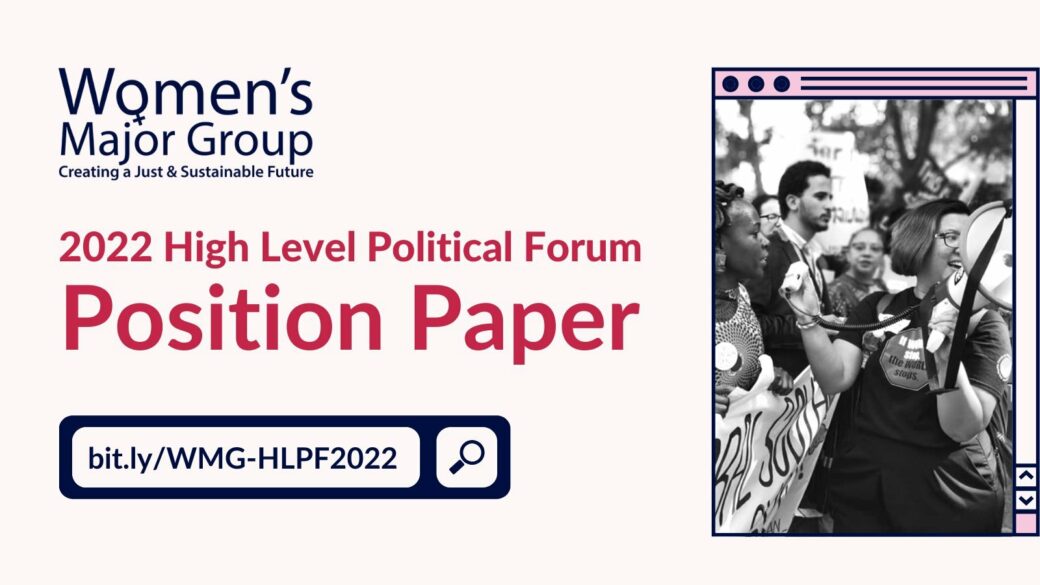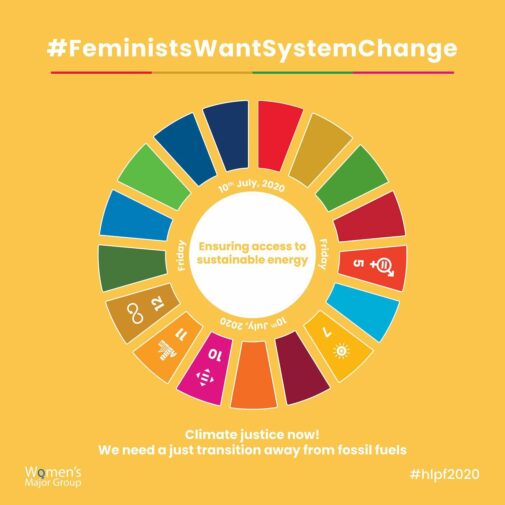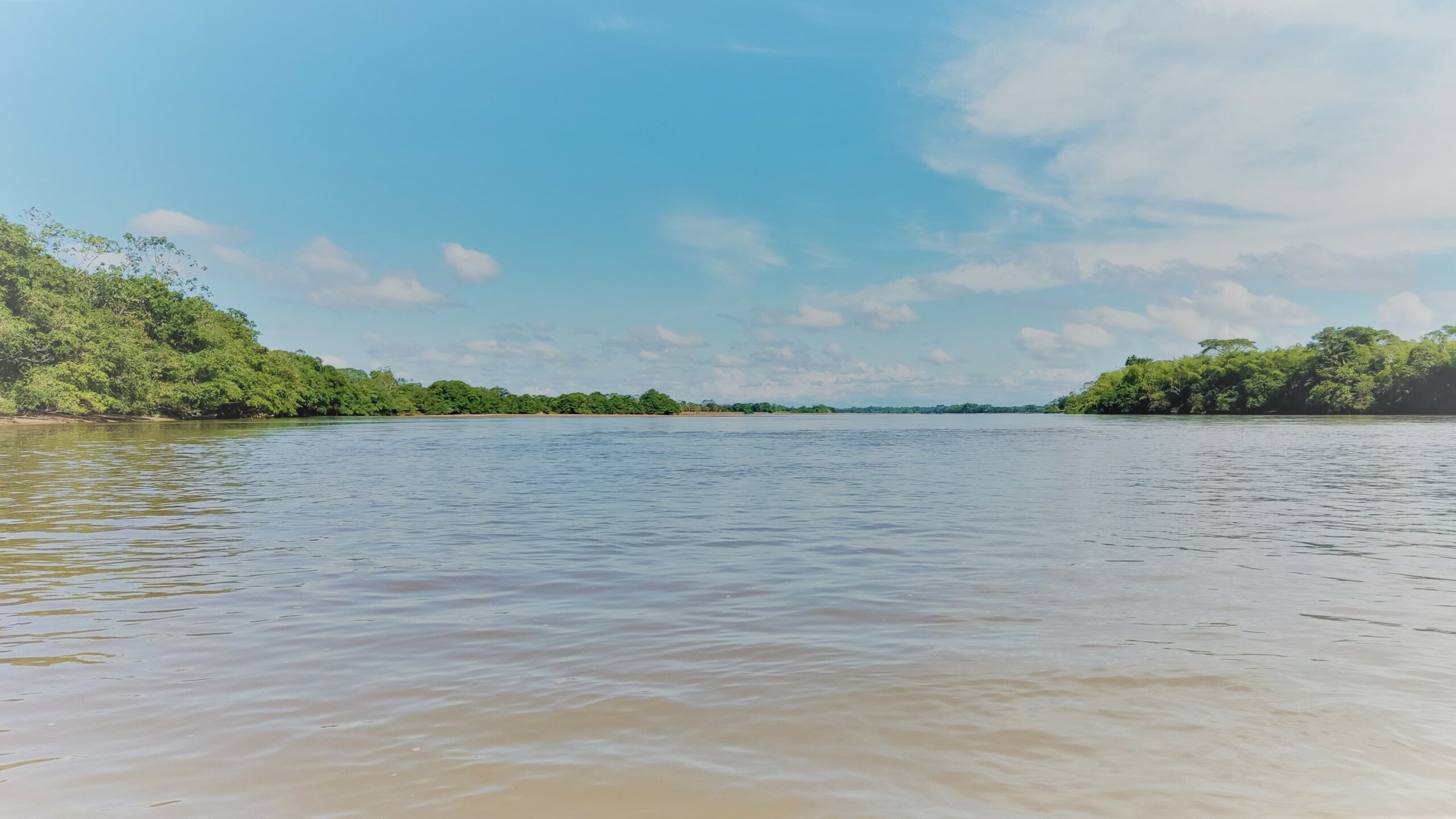Women’s Major Group launches Position Paper for 2022 High-Level Political Forum

“Another world is not only possible, she is on her way.” ― Arundhati Roy
The Women’s Major Group has just launched its Position Paper for the 2022 High-Level Political Forum (HLPF). Gathering the intersectional analyses of feminists and gender equality activists worldwide, the position paper reviews systemic barriers and recommendations for achieving the Sustainable Development Goals (SDGs) and building a just recovery and feminist response to the pandemic.
Click here to read and download the full HLPF 2022 position paper.
The Global Forest Coalition served as a contributor and signatory of the position paper, which quotes our gender justice campaigners Johanna Molina and Jeanette Sequeira. They explain:
“[an] anthropocentric, patriarchal and colonialist worldview leads us to view the planet as if it had no limits, to put nature and common goods exclusively at our service, and to assign some people more value than others, justifying policies of natural resource extraction and dispossession that have various impacts on territories, peoples and communities, and particularly on women.”
GFC team members Juana Vera Delgado and Coraina de la Plaza also made inputs to the report, which draws on several of our publications that examine gender, climate, forests, and extractive industries. For example, in key data regarding Sustainable Development Goal 15, we read:
“Work burdens related to producing and collecting food for household consumption, non-timber forest products, water, health care and wellbeing are intensified when local, biodiverse forests are privatised and replaced with monoculture tree plantations.”
Here is the executive summary of the report:
By the end of this Decade of Action for the Sustainable Development Goals, the Women’s Major Group hopes to reflect on this moment as the time when we rebuilt from COVID-19 by abandoning austerity, competition, and extractivist, exploitative, and patriarchal systems, and replaced them with feminist decolonial ethics of care, equality and abundance.
By 2030, we have a vision in which we all celebrate, protect, and honor the full diversity of human life and the planet with a special focus on fulfilling the human rights of women, girls, and gender-diverse people.
We see a world that protects, defends, and funds environmental and women human rights defenders—a landscape of flourishing feminist movements. We envision robust space for civil society to meaningfully engage, decide, participate, and demand justice and accountability in open and democratic processes.
We have a vision of a world that recognizes and guarantees our bodily autonomy, freedom from violence, and sexual and reproductive health as human rights—a world in which our bodies are our own.
We see a world in which girls excel in quality, inclusive, and affordable education and training systems, where they receive comprehensive sexuality, anti-colonial, climate justice and human rights education, and in which educational opportunities are lifelong.
We have a vision of a new global economic paradigm that centers human rights, care, and redistribution over unbridled growth. Where we have fully-funded, universal, gender-transformative health and social protection systems; living wages and decent work for all; quality care, health, education, water, sanitation, and energy as public services; and where women workers—no matter in the formal or informal economy—have their rights to work and at work respected.
We see a world in which we have rejected false solutions to the climate crisis: a world of climate justice with funding for grassroots gender-just climate solutions and loss and damage, and climate reparations for the most affected communities. We see women, girls, gender-diverse people, and Indigenous Peoples with sovereignty over their land, water, bodies, and food systems.
We have a vision of a world where all countries have the fiscal space to guarantee public services instead of servicing excessive debt. We see a world that has eliminated illicit financial flows, enacted progressive tax systems and corporate regulation, and created trade agreements centered on the fulfillment of human rights rather than the exploitation and expropriation of resources and the prioritization of profit for the few.
We see a world at peace—where the resources that used to sustain militarism have been diverted to support the fulfillment and enjoyment of human rights.
We envision a multilateralism centered on global solidarity and cooperation that welcomes the people, especially the most marginalized, into halls of power and decision-making.
We continue to participate in this space because we know a just and inclusive world is possible. We trust our partnerships and cross-movement building and call on multilateral institutions to walk with us in this path because only together can we make this vision a reality.
 We commend the Women’s Major Group for this useful and comprehensive document, which sets out the following cross-cutting recommendations for global policy-makers:
We commend the Women’s Major Group for this useful and comprehensive document, which sets out the following cross-cutting recommendations for global policy-makers:
1. Take a human rights-based and gender transformative approach to the implementation of all aspects of the 2030 Agenda and the response to the COVID-19 pandemic and its related crises. Respect, protect, and fulfill the human rights, including sexual and reproductive rights, of all people particularly, women, girls, and gender-diverse people. Center the elimination of inequalities and the unjust distribution of power in all policies and actions.
2. Protect and expand the space for feminist and social justice movements to participate, mobilize, and demand action. End the practice of punitive legislation targeting environmental and women human rights defenders, activists, and social leaders, especially Indigenous and Afro-descendant leaders. End impunity for forced disappearances, killings, threats, harassment, intimidation, and violence against environmental and women human rights defenders, activists, and social leaders.
3. Actively seek out and support the participation of women, girls and gender-diverse people in the creation, implementation, monitoring, and evaluation of policies and programs. Establish and maintain institutionalized spaces within local, national, regional, and global policy spaces where feminist and social justice movements can equally, meaningfully, and effectively participate. We are experts in our own lives and beyond, including sustainable development. Policies and programs that do not include our voices and perspectives will never meet the world’s needs and our rights and will continue to leave the majority of people behind.
4. Dismantle the unjust economic systems that perpetuate and deepen inequalities between and within countries. Challenge and end the privatization and commodification of public goods and services; exploitation of biodiversity and natural resources; cycles of unsustainable debt; and trade agreements that undermine labor rights, lead to environmental degradation, and perpetuate colonial dynamics, as well as gender disparities. In its place, create a new development paradigm that prioritizes global, inclusive well-being for people and the planet—a feminist, decolonial Global Green New Deal as called for by the Feminist Action Nexus for Economic and Climate Justice.
5. Allocate adequate resources, technology transfer, and training to strengthen data and statistical systems and collect and communicate disaggregated data, including increasing the capacity of national statistics offices. Invest in the collection, analysis, and use of data, including individual-level data about multidimensional poverty and inequality, disaggregated by income, gender, age, race, marital status, ethnicity, migratory status, disability, geographic location, and other characteristics relevant in national contexts. This data is necessary to further our understanding of the interlinkages between the SDGs with an intersectional lens. Value qualitative data in the same way that quantitative data is valued, as well as data generated by civil society organizations, local communities, and Indigenous Peoples.
6. Develop and implement system-wide policy coherence and coordination between the High Level Political Forum and other UN human rights and development systems and processes, including at regional and national levels. Policy coherence furthers the effective implementation, monitoring, learning and accountability of the 2030 Agenda, as well as COVID-19 recovery policies.
7. Increase funding and support for civil society, particularly for feminist, women- and youth-led organizations and movements, with priority given to those formed and led by people historically marginalized on the basis of gender identity and expression, class, caste, sexual orientation, indigeneity, race, ethnicity, disability, or religion. Provide multi-year, flexible, core operating support and adopt funding practices that encourage collaboration rather than competition between organizations and movements.











